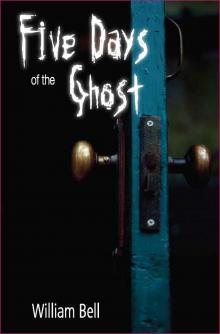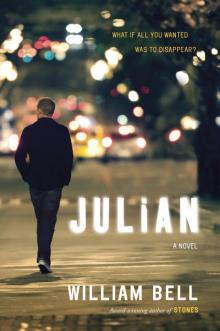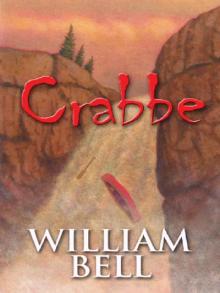- Home
- William Bell
The Blue Helmet Page 2
The Blue Helmet Read online
Page 2
For a long time I thought he was burying himself in work because he missed my mom. Then one day I realized it was more than that. He was paying back the thousands he had borrowed so he could take her to Italy. From the age of seven I grew up without parents. One was dead, one was a zombie who hardly spoke to me, who I often felt blamed me in some way for his wife’s deadly illness. Which was funny, because for a long time I blamed him.
I spent most of my life alone, without much help when my eyes dimmed from the dark rage that took hold of me and scared the hell out of me because I didn’t know what it was or how to deal with it.
FOUR
“YOU SMELL LIKE ONIONS.”
“How’s it going, Your Majesty?” I said to the old woman beside me.
I poured myself a coffee and replaced the pot on the hot-plate under a sign that said
HELP YOURSELF
COFFEE $1
WITH MILK &/OR SUGAR,$1.50
“If people want to ruin good Colombian,” Reena had told me more than a month ago when she showed me around Reena’s Unique Café for the first time, “they’ll have to pay for the privilege.”
I called the old lady “Your Majesty” because she spent all day circling the block, pushing a grocery cart piled high with her belongings and calling out, “I am the Queen of Sweden!” Rain or shine, she wore a long knitted scarf, striped blue and gold, and a dirty white toque. Where she slept at night, I had no idea—probably in the big park across the road.
“You smell like onions,” she repeated, dumping another spoonful of sugar into her coffee and stirring as if she was punishing it. “And your eyes are red.”
“Been slicing in the kitchen. For the soup of the day.”
“You work here?” she asked.
“Yeah. Chief busboy and onion chopper-upper.”
“Do you like it?”
“Not really, but I don’t have much choice.”
“Reena never mentioned you,” she said, and shuffled off to a table.
The Queen and I had had the same conversation half a dozen times. Her memory seemed to come and go, but she remembered to turn up at the café almost every morning.
A few more street people, their faces pale, their clothes tattered, sat around the tables Reena kept at the back of the small restaurant, drinking coffee and staring into a personal nowhere. Reena let them have the coffee—and cookies, if she had any around—for nothing, as long as they were quiet and didn’t stay too long. She had a soft spot for people who floated on the edge of the stream, which is why she had taken me in.
Reena had given me the room on the third floor, up a narrow flight of creaky stairs from her apartment. There was space for a bed, a night table that was really an upended wooden box, an easy chair that was older than me, and one of those rugs made from one piece of material that spiralled out from the centre. No TV. No sound system, unless you counted the digital clock radio that read 10:00 a.m. all day. The ancient radiator thumped and gurgled at night.
I had my own bathroom with a shower, and the room was bright. The front window looked out over Lakeshore Boulevard and the park. If I craned my neck, I could glimpse the lake. From the side window I could see 18th Street and the run-down hotel where Carpino had parked the day he delivered me to Reena. It was an okay place to stay until I figured out my next move.
I carried my coffee to the booth nearest the counter. It was one of five that Reena had kept when she renovated the place a few years before. Why she hung onto them, she never explained. They were covered in red vinyl pimpled by cigarette burns. A glass-fronted console attached to the wall above each scratched and pitted table allowed you to flip through a dozen panels and choose tunes by pushing buttons labelled with letters and numbers. The consoles had once been wired to a juke box, but the juke was gone, leaving orphaned songs like “A White Sports Coat and a Pink Carnation,” “Blue Suede Shoes,” and “Hand Jive.”
The restaurant hummed with what Reena called the morning crowd—students from the college beside the park, stuffed with self-importance and thirsty for a caffeine fix, and regulars from the neighbourhood, sitting at the small tables and yakking or reading the paper while they sipped coffee and nibbled on muffins. Outside, the sun glinted off rush-hour windshields, and a streetcar rumbled and screeched to a stop at the traffic lights.
Behind me I heard the two-tone squeak of the swinging door to the kitchen. Reena slid into the booth across from me, an unfiltered cigarette in the corner of her mouth. She was wearing an almost-white apron, double-wrapped high above her waist, and a hairnet. I glanced at the “Absolutely No Smoking” sign above the console.
I still felt like she had cooked things up with my father to keep me away from home. But Reena didn’t seem to care what anyone thought of her, including me, so she didn’t play the role of the kindly, caring aunt. She hadn’t tried to reform me. I had my room and a job in her restaurant, busing tables, sweeping up, lending a hand in the kitchen. She paid me, after deducting for “room and board.” And she talked to me the same way she talked to everyone else, by showing respect and demanding it at the same time. It was understood that if I screwed up I would be gone.
We had reached that understanding one night about a week after Carpino dumped me at Reena’s place. I had lain awake for hours after I climbed the stairs to my room, staring at the illuminated digits on the clock radio. A one, a zero, a colon, two more zeroes. And beside the little tail that hung off the upper left corner of the one, the tiny white letters, AM, with a red dot glowing next to them. I focused on those numbers for a long time, knowing they would never change.
I got out of bed and pulled on my clothes. I sneaked down the back stairs, threw on my coat, and closed the door carefully behind me. I ran across the deserted road and into the park, skirting the darkened buildings, heading for a stand of evergreens by the lake. I planned to stay there, more or less out of sight, until the trains started up early next morning, then head west toward Hamilton.
Maybe “planned” isn’t the right word, because I hadn’t worked out what I’d do when I got home—and I hadn’t paid any attention to the weather. Gusts of freezing rain swept in from the lake, and within an hour my teeth were chattering, my hair was a helmet of ice, and every few seconds a shudder rattled my bones. Before long I found myself on the sidewalk beside the café, shoulders hunched against the cold, the side of my face burning from the sleet driven by the wind, banging on Reena’s door. It took her a long time to answer.
“Forgot your key, I suppose,” she said, standing in her nice warm vestibule wearing furry pink slippers, holding her woollen robe closed at her throat.
She knew damn well why I was standing out in the cold. “Yeah, right,” I said.
“You look like a drowned cat.”
“If you’re planning to apply for the Mother of the Year award, I wouldn’t bother,” I said, pushing past her and clomping up the stairs.
But she made me come back down to the kitchen after I had changed my clothes, and she sat me down at the table.
“Look, Lee, even a fool knows when he’s got no choices left.”
“I guess you’re right,” I admitted.
“So, give this place a chance. It won’t be so bad. If you want to call up your friends once in a while, I don’t mind. Long distance to Hamilton isn’t very expensive.”
“Okay,” I replied, suddenly tired. “I’m going to bed now.”
I returned to the room upstairs, lay down in my clothes, and looked at the clock. I didn’t tell her that I had no friends to call, anyway.
Now, sitting across from me in the booth, squinting against the smoke, she asked, “In the mood for a surprise?”
“I guess,” I answered.
“Come on.”
She led me through the kitchen and out the back door into the tiny courtyard, an area about the size of four cars parked side by side, enclosed by a two-metre-high brick wall. Huge flowerpots waited for the spring planting. Lawn furniture, rusting at the edges, had
been shoved into one corner. Against the wall near the steel-clad door stood a bicycle.
“I’ve decided, if you agree, to start a delivery service,” Reena said. “Solid, longtime customers only. And a few who aren’t quite ready for Meals-On-Wheels but find home service convenient. Maybe a few deliveries a day.”
“With that?” I said.
It was a hybrid, a cross between a street bike and mountain bike. The olive paint job was scaly and blotched with rust.
“Nobody,” I said, “will want to steal this thing. It looks like a stripped-down tank.”
“I don’t know from bikes, but a friend told me it’s in good condition. Said I could have it cheap.”
I crouched and looked closer. Eighteen gears, no springs or shocks, wide tires with street treads, straight handlebars showing rust at the welds. A chain shiny with oil, new cables, clean hubs. A crappy-looking but well-maintained rig.
“Yeah, it’s in good shape,” I admitted. “I take it I’m the new delivery boy.”
She pushed a strand of blonde hair off her forehead and grinned. “Let’s say ‘courier.’ It sounds classier.”
“How do you know I won’t take off one day and never come back?”
“If you do, send back the bike. It cost me a hundred bucks. Anyway, what do you think?”
I was attracted by the idea of getting away from the boredom of the restaurant from time to time. And I liked the fact that Reena had said “if you agree.”
“We’ll need a good lock,” I said. “And a rack. And pannier bags to carry the deliveries. Oh, and a map. I grew up in Hamilton, you know.”
“Well,” Reena said, flaming a new cigarette, “nobody’s perfect.”
FIVE
A COUPLE OF DAYS later, my first delivery took me to a home right on the lake at the bottom of 12th Street. The long, one-storey building looked more like a miniature factory than a house. Reena had warned me to be polite to the customers and had given me a long list of useless instructions. How hard can it be, I asked myself. Drop off the bag and leave. I didn’t even have to handle the money—all the orders would be put on account.
Reena had said to take the food to the back door, so I coasted down the driveway into the yard, parked the tank against the house, and lifted the bag of food out of the pannier. There were whitecaps on the lake and a couple of Canada geese waddled across the lawn as if they owned the place. In the middle of the yard, a contraption shaped like an upended pail with a small box stuck on the side sat atop a pole. A little propeller turned slowly on the end of a rod that curved up and away from the main body.
I rapped on the door. A voice thundered from somewhere inside. “Yeah?”
“Reena’s,” I shouted, pushing the door open.
“Nope, this is Abe’s.” I heard a booming laugh. “Just kidding. Come through to the study. Dump the goodies on the kitchen table on your way by.”
I went inside. A wide-shouldered man shouted a greeting—“Howya doing?”—from a chair where he sat tapping furiously on a computer keyboard. A spreadsheet filled the screen. On another monitor, coloured shapes jerked across a map of North America as if pulled by an invisible string. A large photo of a middle-aged woman had been placed between the computers. Cigar smoke hung in the air like a blue mist, and an empty glass stood on the desk beside a whiskey bottle and an ice bucket.
The man gave one last tap and slowly swivelled around to face me. His bald head was fringed with greying hair, and he wore a white shirt and dark tie under a paisley vest. A cigar jutted from the corner of his mouth, smoke curling from the long ash at the tip.
“Take a seat,” he said, his voice like gravel.
I lifted a stack of printed sheets from the only other chair in the room and put them on the floor.
“Cuppa tea or coffee?” he offered.
“No, thanks. I’m okay.”
“I’d offer you a drink, but you’re driving,” he chuckled as he reached for the bottle and poured a couple of inches of whiskey into the glass. Ice cubes clinked as he took a sip.
“So you’re Reena’s nephew,” he said.
“Yup.”
“I’m Abe Krantz. And you’re—?”
“Lee.”
“Reena’s a mensch. She and my late wife were great friends. I was happy to hear she’s starting a delivery service. Makes things easy for me. I don’t like to cook much. I guess I’ll be seeing you a few times a week. I don’t get much company.”
“I—”
“Central to Charlie three.”
I looked up towards the source of the static and tinny voice. A small object the size of a desk phone, plastered with coloured buttons, sat on a shelf beside a row of reference books.
“It’s a scanner,” Krantz explained, picking up a remote. “Also a two-way shortwave radio.” He pressed a button and a metallic computerized voice reeled off temperature and humidity, then started into a weather forecast. Krantz thumbed another button and the lights on the radio died. “Lets me listen in on the cops, fire department, ambulances and other stuff. Also the weather, including marine. I’m a watcher.”
“A what?”
“Did you happen to notice my weather station in the yard?”
“Um …”
“That ungainly looking thing on the pole?”
“Oh. Yeah.”
“It measures precipitation, temp, humidity, wind velocity and direction, and a few other things, then feeds the data to the receiver on the wall over there.”
He pointed to a grey box with an LED screen full of numbers. “It’s wireless. And it downloads to the computer every two hours. Also wirelessly. The computer compiles the data, develops local forecasts, charts patterns, et cetera, et cetera.”
“Great,” I said.
“So I always know what the weather will be tomorrow and forward.”
“Why not just listen to the radio? I mean, the normal one.”
“Because it isn’t very accurate. Besides, this is more fun. There’s lots more to it.”
“I’ll bet,” I said, thinking, sounds pretty lame to me.
Krantz laughed. “We’ve barely met and I’ve already bored you to death with everything you didn’t want to know about weather-watching. What do I owe you for the take-out?”
“Reena said she’d run a tab for you.”
“Okay, well, let me give you something for dropping it off.”
I got to my feet. “That’s okay. Delivery’s free.”
He took out his wallet and handed me a five-dollar bill. “Maybe so, but take this anyway. As a favour to me.”
I stuffed the bill into my pants pocket.
“Forgive me if I don’t see you out,” Krantz said. “Put the lock on the back door when you go, will you?”
“Sure. And thanks.”
“See you soon,” he said, and turned back to the keyboard. “And take your umbrella with you tomorrow. It’s gonna rain.”
I climbed onto the tank and wheeled out onto the street. Five bucks tip, I thought. This courier thing is okay.
That night, just after I climbed the stairs to my room, the phone rang in Reena’s apartment. After she spoke for a few minutes, she called out, “Lee, it’s for you.”
The phone was in her kitchen. She was sitting at the little table by the window, a glass of wine beside the newspaper, a smoking cigarette in the ashtray beside it.
I picked up the phone. “Hello.”
“Lee, it’s Dad.”
I hesitated for a moment, then, without saying anything, cut the connection. Reena looked up from her paper, her face neutral.
“See you in the morning,” I said.
I trudged back upstairs and threw myself onto my bed, facing the wall. I knew he’d call back, maybe tomorrow, maybe in a few days. He’d keep at it. He was stubborn—“determined,” he used to say to my mother. “Bullheaded,” she’d reply with a smile.
I rolled over and kicked off my shoes, my eyes coming to rest on a plastic tumbler on my night table. I had
brought it upstairs earlier in the evening, full of cola. I remembered the mornings when I was a little kid. When I got up and padded into the kitchen, cotton-headed with sleep and rubbing my eyes, my breakfast would be ready. My own special cereal bowl with my name printed in a line around the inside of the rim, LeeLeeLee, in one continuous word. My own white plastic tumbler with the red spaceship on the side in a cloud of blue stars, full of apple juice. A big silver spoon with CN engraved on the handle. A carton of cold milk and a box of puffed wheat—unsweetened because Mom was always on a campaign against refined sugar. Mom sitting in her housecoat, reading the paper.
The morning after she was rushed to the hospital, my father had laid out my breakfast, and when I came into the kitchen and saw it, I freaked, knocking the milk carton onto the floor, flinging the cereal box across the room, sweeping the glass and bowl off the table, crying and screaming.
“What’s the matter?” my father said over and over as I wailed. “What’s the matter?” He finally figured out what I had been unable to explain. He had put out the wrong bowl, used the wrong glass, chosen the wrong spoon. He mopped up the lake of milk and puffed wheat, and made things right. I ate my breakfast, sniffling, not sure what had happened. From then on, the morning routine never changed.
But I guess I did. I stopped eating puffed wheat. Stopped breakfast altogether, even stopped gulping down the juice as I flew out the door, late for school. When I was in high school, right up to the day he kicked me out, I saw the same damn bowl and spoon and tumbler in the same damn place at the table every morning. Like he was making some kind of point. Like he was trying to preserve something we both knew was gone.
SIX
BEFORE I BEGAN THE day’s assassination of soup vegetables, Reena handed me a paper bag and asked me to take it to Andrea, the pharmacist. I hung up my apron and perched my paper hat on the knife block.

 Stones
Stones Fanatics
Fanatics Alma
Alma Speak to the Earth
Speak to the Earth Five Days of the Ghost
Five Days of the Ghost Only in the Movies
Only in the Movies Julian
Julian Just Some Stuff I Wrote
Just Some Stuff I Wrote Zack
Zack Forbidden City
Forbidden City Death Wind
Death Wind No Signature
No Signature Crabbe
Crabbe